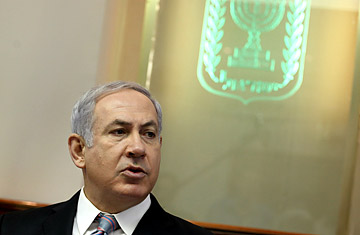
Israeli Prime Minister Benjamin Netanyahu opens the weekly cabinet meeting at his Jerusalem office on October 10, 2010.
There is muddling through, and then there is whatever Israel's prime minister has been up to in the last two weeks. While the world wonders whether peace talks with Palestinians will survive the resumption of Israeli settlers building more homes on what would become state two in the two-state solution, Benjamin Netanyahu dances to music only he can hear. And no one knows where he's headed next.
The confusion only started when Netanyahu ceded the podium at the United Nations to his right-wing foreign minister, Avigdor Lieberman, who delivered a hardline speech largely at odds with the negotiating position of the government he serves. The prime minister at first appeared to distance himself from the remarks, but just days later endorsed a controversial proposal plucked from the bouquet Lieberman has held before Israel's right wing for years: a loyalty oath.
Netanyahu heartily advocated a new law requiring newly naturalized citizens to pledge allegiance to Israel as a "Jewish and democratic state," language that one of his more moderate ministers called a slap to Israel's Arab minority. "We've already beaten them," intelligence minister Dan Meridor said at the cabinet meeting where the measure passed handily, "There's no reason to stick the word 'Jewish' into every possible place.''
The Israeli media was outraged across the board. "With this bill, Israel is buying an exit from the family of nations," Israel's preeminent columnist, Nahum Barnea, warned in the daily Yedioth Ahronoth. "We have defeated ourselves," conservative Ben-Dor Yemeni lamented in Ma'ariv, calling the measure "both justified and foolish."
What did any of it have to do with the peace talks? The apparent answer emerged Tuesday, when Netanyahu rode down Kaplan Street to the Knesset. In his speech welcoming parliamentarians from their summer break, the prime minister drew together the strands strewn across the previous days, tied them into a bow, and placed them at the feet of Mahmoud Abbas, the president of the Palestinian Authority.
"If the Palestinian leadership will unequivocally say to its people that it recognizes Israel as the nation-state of the Jewish people," Netanyahu declared, "I will be prepared to convene my government and ask for an additional suspension of [settlement] construction for a limited period of time."
Halting construction is precisely what it would take to kick-start the stalled talks. Just one small hitch: If Palestinian negotiators begin the talks by recognizing Israel as a Jewish state, they will have conceded a major point of contention — the right of non-Jews (read: Palestinians) to return to the homes they left in 1948 as Jewish forces swept across the landscape that became Israel. As practical matter, the Palestinians' "right of return" may well be negotiated away, but not for a price as cheap as a couple months' pause in building settlements the world at large regards as illegal. "When he demands that Abbas recognize Israel as a state of the Jewish people, he is offering assisted political suicide to the Palestinian leader," Akiva Eldar wrote in Haaretz the next morning.
Abbas has, in any event, rejected the request again and again, pointing out that the Palestine Liberation Organization formally recognized Israel as a sovereign state 17 years ago. "Name yourself, it's not my business," he said in Ramallah last year. "All I know is that there is the state of Israel, in the borders of [before the war of] 1967." That year, Israeli forces overran Arab armies and took the West Bank from Jordan and the Gaza Strip from Egypt (now it's run by the Palestinian Islamist group Hamas, Abbas' political rival). The Palestinians say they want all that land back, a position they underlined Wednesday in the terms of the hour: "Any formulation the Americans present — even asking us to call Israel the 'Chinese State' — we will agree to it, as long as we receive the 1967 borders," said Yasser Abed Yabbo, a senior PLO official.
With both sides now issuing demands in public, the episode appeared to bring talks not a bit closer to resuming behind closed doors, where the real work gets done. Netanyahu, in particular, was getting pasted by the pro-peace Kadima party for defying President Obama's request to suspend construction. Said former Prime Minister Ehud Olmert (who has troubles of his own): "Do you really believe that it is possible to argue with the whole world, insult the whole world and reject the whole world while enjoying such dividends as improved relations with the U..S. and Europe?"
But others say Netanyahu hasn't finished dancing. Efraim Inbar, a political scientist at Israel's Bar-Ilan University, sees in the loyalty oath sideshow a prime minister tending to his right-wing coalition, perhaps softening them up for a concession in the near future. What was overlooked in the terms the prime minister set out before the Knesset, Inbar points out, was the other half of the equation: a stated willingness to resume the construction freeze. "He said he was willing to do it, but give me something in return," Inbar says. "We're in the Middle East. Nothing goes for free. You don't want to be a freier ." The professor of political science offers a lesson in Yiddish. "You know freier?' A freier is a sucker."
